Morocco
A month has passed since a devastating earthquake struck Morocco, resulting in the tragic loss of nearly 3,000 lives and widespread destruction of buildings in villages across the Atlas Mountains. As the dust settles, residents are now faced with the formidable task of rebuilding their lives and communities.
In Amizmiz, a village located 36 miles (58 kilometers) from Marrakech, signs of recovery are slowly emerging amid the debris where once stood homes. The heartbeat of village life is gradually returning, but the stark reality is sinking in - the journey to recovery will be lengthy and challenging. Among the concerns that weigh heavily on the minds of residents are housing, economic revival, and the need for psychological support for their fellow community members.
The Moroccan government has outlined plans to provide assistance to families for the reconstruction of their destroyed homes. Those who did not own homes prior to the disaster will have to rely on a modest stipend of 2,500 dirhams ($243) for support, whereas homeowners will receive rebuilding funds and the opportunity to return to their properties.
Solidarity Across Borders: Michel Deslandes' Humanitarian Mission in the Wake of the Moroccan Earthquake
In the aftermath of a devastating earthquake in Morocco, Michel Deslandes, a compassionate individual with a longstanding desire to explore the country, embarked on a journey from France to offer assistance and support to the affected communities. Arriving more than three weeks after the seismic event, Michel witnessed both the immediate relief efforts and the ongoing challenges faced by the local population.
Roads Cleared and Immediate Relief Efforts:
Michel described the remarkable progress in clearing roads and restoring access to even the remotest villages. He observed the aftermath of the earthquake, such as damaged safety rails and fallen rocks, but noted the effective clearance of roads. Distribution of aid packages, including tents, gas, dishes, and blankets, was witnessed, showcasing the immediate response by civil engineering teams, firefighters, and tanker trucks delivering water. Michel highlighted the coordination of efforts, emphasizing that almost all roads were accessible, ensuring aid reached even the most secluded villages.
Community Solidarity:
Reflecting on the resilience of the mountain communities, Michel observed that adversity fosters a strong sense of solidarity. He noted that in challenging environments, such as mountainous regions, people naturally come together to support one another. The cultural and religious influences in these villages contribute to a daily form of solidarity, where the well-being of each individual is a collective concern. While not necessarily heroic, Michel acknowledged the everyday acts of support and care demonstrated by the community members.
Challenges and Concerns:
Michel discussed the challenges faced by the communities, particularly the fragility of the tents provided by the Moroccan government. With winter approaching, concerns about the stability of these shelters heightened, especially at higher altitudes where snowfall is expected. Michel also highlighted two notable issues: the limited visibility of women and girls in the villages, and the pervasive problem of plastic waste. He pointed out the lack of awareness and infrastructure for plastic waste management, emphasizing the need for education on environmental sustainability.
Conversations with Locals:
Despite the language barrier (Michel does not speak Arabic), he engaged in conversations with local residents, primarily men who spoke French. While he did not sense specific demands, he observed a general acceptance of the situation and a unique perspective on the earthquake as a natural phenomenon. The locals displayed a remarkable ability to cope with the aftermath, expressing a profound sense of faith and resilience in the face of adversity.
Safety Measures and Local Authorities' Challenges:
Michel emphasized the importance of safety measures taken by the locals to mitigate the impact of aftershocks. He highlighted the decision to keep people in tents rather than returning to damaged houses to avoid potential harm during subsequent tremors. Regarding the challenges faced by local authorities and rescue teams, Michel acknowledged the significant logistical achievements in clearing roads within the first few days. However, he also noted the difficulties arising from political tensions, delaying French aid delivery and necessitating careful consideration of how international assistance is provided.
Urgent Needs and Concerns:
As winter approached, Michel outlined immediate needs, including blankets, shoes, waterproofing for tents, and stoves. He stressed the necessity of local production for items like stoves, harnessing the skills of artisans in the region. Additionally, Michel highlighted the need for specific items like basins to transport water, addressing the challenge of infrequent water deliveries to villages.
Motivation to Get Involved:
Michel shared his motivation to engage in humanitarian efforts, citing a longstanding attraction to Morocco, sparked by a positive encounter with a Moroccan individual in France. Over the years, his desire to visit Morocco intensified, and the earthquake provided a unique opportunity to contribute to the well-being of the communities he had longed to connect with.
Immediate Action and Formation of Solidarité Limousin Maroc:
Motivated by the urgency of the situation, Michel decided to take immediate action. He initiated the creation of an association called "Solidarité Limousin Maroc." Michel emphasized the importance of purchasing goods locally and working with artisans to address the specific needs of the affected communities. He recounted challenges faced by French aid convoys due to political issues, underscoring the efficiency and impact of supporting local economies.
Gratitude and Overwhelming Reception:
Michel expressed his gratitude for the warm reception he received from the Moroccan communities. He shared touching anecdotes of being welcomed with open arms, from being offered meals to having his motorcycle boots repaired by a local artisan. Michel emphasized the generosity of the people he encountered, describing an emotional moment where he was publicly thanked by a village leader for his mere presence and concern.
How People Can Support:
Michel discussed the ongoing efforts to gather support for the affected communities. He encouraged financial contributions and outlined the process of contacting him directly or through the soon-to-be-established Solidarité Limousin Maroc association. Michel stressed the importance of transparency and direct engagement to ensure that aid reaches those in need promptly.
Future Projects and Long-Term Vision:
While the immediate focus is on urgent relief efforts, Michel outlined the long-term vision of the Solidarité Limousin Maroc association. He highlighted the association's commitment to facilitating exchanges between the Limousin region and Moroccan villages, encompassing cultural, social, and mutual assistance initiatives. The association aims to contribute to the reconstruction efforts in the spring, emphasizing sustainability and long-lasting partnerships.
Lesson Learned and Inspirations:
In concluding his testimony, Michel shared a valuable lesson learned from his experience: the importance of taking the initiative to connect with people and make a difference when time permits. He encouraged others to step out of their comfort zones, emphasizing that personal journeys, especially when undertaken alone, lead to meaningful encounters and opportunities to positively impact the lives of others.
Michel Deslandes' journey serves as a testament to the transformative power of individual action and the profound impact of human connections in times of crisis.




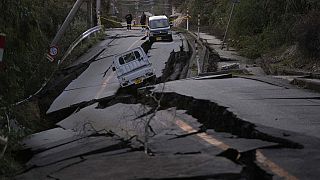
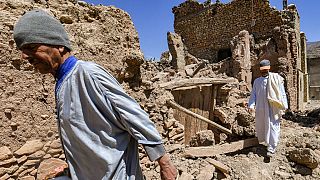
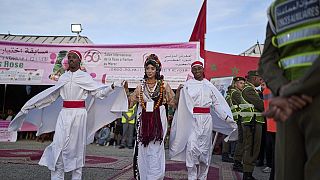
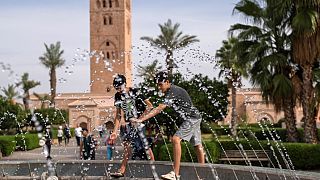
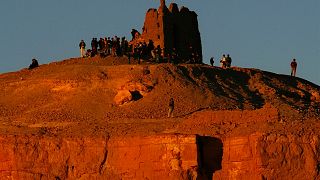


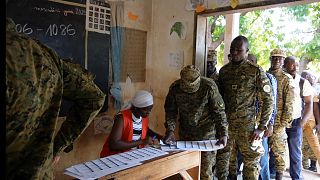
01:56
EU foreign ministers discuss deal with Israel to increase Gaza aid
01:25
MSF: Access to healthcare in Sudan 'almost impossible' as attacks on healthcare facilities increase
01:55
US contractors say colleagues fired live ammunition at Palestinians seeking food
01:50
UN urges renewed political and climate action in Libya amid humanitarian and governance crises
02:35
Aid for hire: For-profit contractors deliver aid in war zones, alarming humanitarian groups
01:09
Wars displace over 122 million people as global aid dwindles – UNHCR